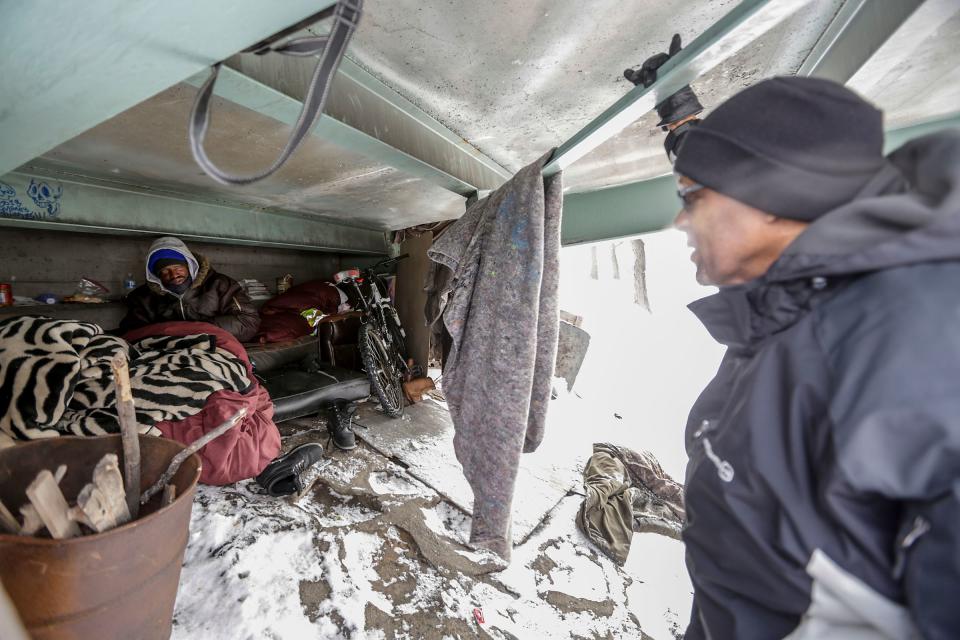As historic cold blasts Midwest, cities focus on vulnerable, homeless
CHICAGO – As the Midwest girds for days of subzero temperatures, government agencies and social service nonprofits are scrambling to get some of their most vulnerable charges out of the cold.
Officials in Chicago have added 500 shelter beds for the homeless and tapped more than 100 religious leaders to make calls and checks on senior citizens. Officials in Detroit report a surge of demand at shelters. And ambulance crews in Minneapolis plan to treat all outside calls as potentially life-threatening.
Chicago Mayor Rahm Emanuel said his administration will dispatch five Chicago Transit Authority buses to the streets Wednesday to give homeless people who might be resistant to going to a shelter a place to warm up.
City workers will canvass the streets for people to assist. Emanuel asked residents to check in on vulnerable neighbors.
“Everyone of us has a role to check on somebody who is maybe a neighbor on the block who is elderly, infirm or needs extra help,” he said.
Chicago has an unhappy history of weather crises wreaking disproportionate harm on some of its most vulnerable populations – and causing headaches for politicians.
A storm over New Year’s weekend in 1999 that dumped more than 21 inches of snow and shut down the iconic Lake Shore Drive for the first time in history was a factor in 43 deaths, including heart attacks while shoveling snow and exposure to cold.
A massive blizzard in January 1979 that left at least seven dead is blamed for the election defeat of Mayor Michael Bilandic a few months later. The city was gridlocked for days; voters blamed Bilandic for being too slow to dig out the city.
In the midst of a heat wave in 1995, the Chicago area recorded more than 700 deaths from heat-related illness in a five-day period. Those who died were disproportionately elderly, poor and African-American.
As the mercury tumbled in Chicago Tuesday, Emanuel urged residents to be smart and act with caution.
“If you don’t need to be outside, don’t go outside,” Emanuel said. “The temperatures today, tomorrow and Thursday are not to be taken lightly. These are actually a public health risk, and you need to treat it appropriately. They are life-threatening conditions and temperatures.”
Officials and nonprofits throughout the Midwest are taking similar actions.
A snowstorm and life-threatening temperature warnings this week have already taxed Detroit shelters, filled soup kitchens and strained nonprofits that help the homeless.
"The phone is ringing off the hook," said Eneida Hajiou, the development director with the Macomb County Rotating Emergency Shelter Team in Roseville. "There is not enough space for all the homeless suffering out there now."

In Sioux Falls, South Dakota, homeless shelters are bracing for increased demand.
The Bishop Dudley House has room for 80 men and 20 women, as well as seven family rooms – and already this winter, they've had a few nights where they’ve exceeded capacity. Wind chills in Sioux Falls could reach the minus-50s on Wednesday.
Development coordinator Amanda Stidd said they won’t turn anyone away.
"We will find a spot for people to come in," she said, whether that's lining cots and mats up where they can, putting people in day rooms or using hospital beds in the shelter's medical respite rooms.
Officials in Milwaukee urged people in need of emergency shelters to call 211 so they could be connected with facilities with available beds.
"This is not the night for anyone to stay outdoors," Mayor Tom Barrett said.
Barrett said all city services will be suspended Wednesday with the exception of police, fire and repair of water main breaks. The city’s priorities will be the safety of city workers and residents.
"This is going to hit us right in the kisser," Barrett said. "Safeguarding life and safety are our No. 1 priority."
Weather emergencies can certainly be tough on first responders who have no choice but to work. Police in Whiteland, Indiana, tongue firmly in cheek, took to social media to urge criminals to take it easy on them.
“If everyone could refrain from committing crime these next few days that would be great k, thanks but srsly tho,” the department tweeted.
Back in Chicago, the forecast is shocking a city whose residents take pride in not letting the weather slow them down.
In the city’s Lakeview neighborhood, Angelo Mavraganes said he would close Stella’s Diner Wednesday due to weather for the first time since his father opened it in 1962.
“If we open, business would be down 50 percent to 70 percent,” Mavraganes said. “A lot of our staff doesn’t live nearby. You don’t want to put anyone in a dangerous situation.”
Still, Mavraganes said, he's concerned about some of the regulars – single, elderly residents – who treat the diner as their second home. The staff has let most of the regulars they’ve seen over the last couple of days that they will close. He worries some will still show.
The waitstaff has assembled a call list of some of the older regulars. They typically check up on if them if they go more than two days without a visit.
Mavragenes hopes to reopen Thursday. He said one of the first things he and his staff plan to do when they get back to work is make a round of calls to make sure everyone is okay.
Contributing: Frank Witsil in Detroit, Trevor Mitchell in Sioux Falls, Vic Ryckaert in Indianapolis, and James B. Nelson in Milwaukee
This article originally appeared on USA TODAY: As historic cold blasts Midwest, cities focus on vulnerable, homeless

